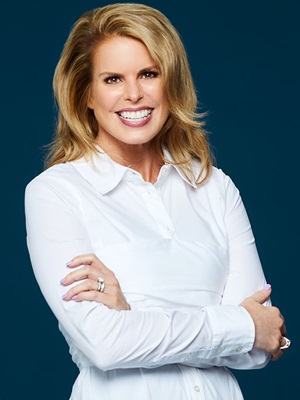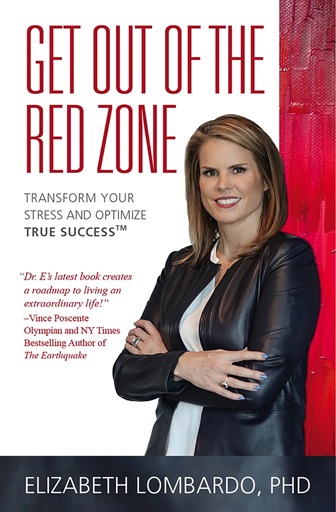Meet Keynote Commencement Speaker Elizabeth Lombardo, PhD '02
by Sarah Hojsak
May 17, 2023

According to Dr. Elizabeth Lombardo, our mental health is our superpower. “Prioritizing your mental well-being is going to help you be successful in whatever you choose to do,” she told us ahead of her upcoming keynote address at the College of Arts and Sciences commencement.
"When we optimize our mental health, not only can we perform better at work, but we have happier relationships and healthier bodies—and that is really pivotal.”
After graduating from Drexel with a PhD in clinical psychology in 2002, Lombardo has gone on to build an impressive career based on the idea that understanding the basics of how our minds work can help us lead happier, more successful lives.
For Lombardo—or “Dr. E,” as her clients call her—the most rewarding part of being a high-profile psychologist is not the celebrities she’s coached, the books she’s written or her countless television appearances. Instead, she finds the most meaning in her ability to have a positive impact on people’s lives. “I am able to take information that's research supported and deliver it in digestible bites that people can actually use in their lives,” Lombardo said. “That's what's most meaningful to me.”
Lombardo will share her science-based knowledge and advice with the class of 2023 as the keynote speaker at the CoAS commencement ceremony on June 15. She speaks more about her career path and offers words of wisdom to graduates in the Q&A below.

Let’s start at the beginning of your journey as a psychologist. Why did you decide to pursue a PhD in Psychology?
After undergrad, I went to graduate school for physical therapy and became a practicing physical therapist. I was working with a particular client we'll call “David,” who had had a surgical amputation because of diabetes. It was my job to teach him how to walk without his entire leg. He was very angry—he yelled at me and told me to leave him alone. The doctors, nurses and therapists agreed that he was struggling, and the attending physician said, “I'll prescribe him Prozac,” and everyone nodded. There's a time and place for medication, but I thought, “Maybe he needs someone to talk to him about this. Maybe he needs to process this. Maybe he needs more than just a pill.” Even though I loved being a physical therapist, I realized right then and there that my true calling was to help people like David.
Even though not everyone has an amputation, we all deal with loss. We all deal with disappointment. We all deal with things that we didn't expect in our lives. How can we work through that and not only survive, but be able to flourish, even during challenging times? So I went back to school for psychology. During my first week, I was madly taking notes when something hit me. Why do I have to get a PhD to know this? We all benefit from understanding the basics of how our mind works, and how to make it work for us instead of against us. It became my mission to help people benefit from this vital information without having to get a degree.
Do you have any favorite memories from your time as a PhD student?
My mentor was Art Nezu, PhD (Distinguished University Professor of Psychology). We would do mock sessions, and he would be the clinician, and I remember we would all try to think of the hardest scenario to give to him when we were pretending to be the client. We were like, “There's no way he can handle this one.” And whatever we threw at him, every single time, not only did he say something that made sense, but it was so eloquent and so well put together, and so spontaneous. I remember thinking, “I don't know if I'll ever be able to do that.” I was always very amazed at his clinical skills.
What is your favorite part of speaking to students? Why do you think it’s important to reach this group?
Stress levels are at an all-time high overall, and particularly among their generation. My newest book is called “Get Out of the Red Zone”—the red zone in this case being high levels of distress, the negative aspect of stress. You don't have to be a psychology major to know how stress can negatively impact us, and it's not about getting rid of stress, but optimizing our stress. It's about taking it from distress—that negative, overwhelming stress—to what's called eustress, the positive stress.
Regardless of what's going on in our lives, we have choices. We get to choose how to make our minds work for, instead of against, us. Our biggest obstacle to success and our biggest contributor to success isn’t what's going on externally. It's what we say to ourselves that impacts what we think we're capable of and what we try to achieve.
What do you hope students take away from your commencement address?
Empowering skills to be able to deal with whatever life throws at them. One of the biggest predictors of success is our mindset, but we don't teach this in school. The growth mindset—that sense of hope, sense of self, advocacy, determination—all of that predicts our success. And yet, very rarely do we teach people how to optimize their mindset. I'm working on changing that, but for now I'm hoping to be able to give some tools during the commencement speech.
Drexel’s tagline is Ambition Can’t Wait. What does ambition mean to you?
Ambition means being excited to make positive changes in our lives and in the world. We hear a lot about stress and change and how negative it is, but it doesn't have to be negative. We can be very excited to make things even better in this world. The spirit of continuous improvement. Having ambition, that drive, that engagement—that true desire to focus on what's important to us—gives us passion, excitement, purpose and meaning in our lives. That's when not only individuals flourish, but that's when organizations flourish, and that's really when societies flourish.
A lot of our graduates are still figuring out their next steps. What is your advice for someone who may not know what their purpose is yet?
Stop putting pressure on yourself, because you'll figure it out. I'm a great example. I thought I was going to be a physical therapist for the rest of my life, and even though I love the profession, I realized it wasn't my purpose in life. You want to look at things that are interesting to you, things that can be fulfilling, where you can apply your values and strengths. But what you decide to do now does not have to be your forever. This is not a till death do us part kind of thing. This is where you are in this chapter, and maybe that profession will be with you forever, and maybe it won't. That's fine. Ask yourself, “Is this something that I would enjoy doing, where I can grow and learn and find purpose and meaning?”
We're all works in progress. We don't have to have all our stuff together right now. I'm still getting better and growing, too. There tends to be a lot of perfectionism in this generation of people who are graduating from college. Don’t worry about doing everything perfectly. Move forward in the direction that feels right now.